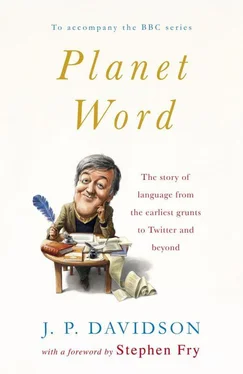:) (happy),
:((sad)
:-D (laughing)
If you want to describe your reaction to something funny, you might send a text combining symbol and abbreviation:)E2E, meaning ‘grinning ear to ear’.
Textese isn’t limited to youth — after all, everyone is looking for ways to send messages as quickly and cheaply as possible. A competition for a texting Poet Laureate awarded second prize to this love poem:
O hart tht sorz
My luv adorz
He mAks me liv
He mAks me giv
Myslf 2 him
As my luv porz
The ode to her husband was texted by a sixty-eight-year-old grandmother from Lancashire.
Teenglish (or Romeo and His Fit Bitch Jules)
What’s fascinating about the way language evolves is the increasing influence young people have on it. Just as from the 1960s onwards a youth culture has dominated music and fashion, so playfulness and experimentation in language has become the preserve of the young. In today’s multicultural Britain, the language of the school and the street is influenced by West African, Afro-Caribbean, Asian and black American as well as urban British. Take the word bling (or sometimes bling-bling ), which originated in American hip-hop culture to mean ostentatious clothing or jewellery, possibly imitating the clashing sound of jewellery or light reflecting off it. Bling was taken up by young people in the UK at the beginning of the twenty-first century, adopted by an older generation within a few years and is being dropped now as old hat by the younger generation. Or nang , a word meaning excellent or great, which seems to have spread in the last decade from Bangladeshi communities in the East End of London to other ethnic groups. It’s thought to be from a Bengali expression for a naked woman.

Ali G: ‘voice of da yoof’
The opening line of Romeo and Juliet was translated into London slang by satirical author Martin Baum in Romeo and His Fit Bitch Jules : ‘Verona was de turf of de feuding Montagues and de Capulet families. And coz they was always brawling and stuff, de prince of Verona told them to cool it or else they was gonna get well mashed if they carried on larging it with each other.’ Baum, like the fictional TV character Ali G (hip-hop obsessed ‘voice of da yoof’), uses Jafaican, a mixture of Jamaican, Asian and Cockney. Linguists refer to it as multicultural London English, a patios which is increasingly the language of young, inner-London, working-class people and has introduced words like bare for ‘very’ (‘I’m bare hungry’), peng for ‘attractive’ or ‘hot’, yoot for child or children and yard for home.
Many of these words spread out from London to the rest of the country via television or music or Facebook, although a recent unscientific but revealing BBC survey of teenage slang around Britain showed huge regional variations. Teenagers were given the following sentences to translate into their own local slang:
John’s girlfriend is really pretty. But she got mad with him the other day because he wanted to hang out with his friends rather than take her to the cinema. She got really angry and stormed off. It was very funny.
Teenagers from a school in west London put it into their own street slang:
John’s chick is proper buff but she switched on her man the other day cos he wanted to jam with his bred’rins instead of taking her out to the cinema. She was proper vexed and dust out. It was bare jokes.
Compare the London slang with that of a school in Keighley, West Yorkshire:
Jonny’s bird is proper fit and she got in a right beef the other day cos he’d rather chill with his mates than go to the cinema. She got stressed and did one. It was quality haha.
And a school in Swansea in Wales:
John’s missus is flat out bangin’. But she was tampin’ the other day ’cause he bombed her out for the boys instead of going to the cinema. She started mouthing. It was hilarious.
Use of the word innit — probably British Asian in origin — is increasingly commonplace amongst young people. In its simplest form it means ‘isn’t it?’ — ‘That’s right, innit?’ — but its usage is being expanded in a rather interesting way. In linguistics, phrases like ‘isn’t it?’ at the end of statements are called tag questions. English has lots of them. ‘You’d better go now, hadn’t you?’ ‘Oh I must, must I?’ ‘That’s quite a wind blowing, isn’t it?’ Other languages often have just one fixed phrase or invariant tag. In French, it’s n’est-ce pas ? in German, nicht wahr ? in Spanish, ¿verdad? Innit , according to some linguists, is being used by young people as an invariant tag and may end up providing English with the n’est-ce pas it lacks. It’s quite a thought, innit?
Slang and jargon serve a similar purpose — to separate the ‘in’ from the ‘out’ group. And nowhere are these definitions more important than in school. Berkeley High is a state school in the San Francisco Bay Area with over 3,000 students. It’s unusual in having a large, educated, middle-class catchment mainly from Berkeley University as well as many lower-paid immigrant families. It’s a melting pot of races — white, Afro-American, Latino, Asian and lots of mixes in between; a veritable Tower of Babel. So the desire to establish a common but exclusive slang vocabulary is strong. The students even compiled their own dictionary of slang, which, when published in 2004, became a local bestseller. Much of the language comes from African-American hip-hop, but Chicano (Mexican English), Jewish, Hindi, punk and sports cultures also contribute words and expressions.
One of the students, Connor, explains: ‘Berkeley is one of the most diverse places you’ll ever be. We have so much slang because we have every ethnic group, we have every social class. It’s the only public school in Berkeley, so everybody that’s not in a private school is here in Berkeley High. So the slang is different, and that’s why there’s so much of it … We have all the language and we use it all.’
The current students dismiss the 2004 dictionary as being already outdated; school slang has moved on. One girl describes with great excitement how words change overnight; a random expression appears, and suddenly everyone’s using it.
‘It can change in one day. Like one hour to the next, it can be just a new word … Someone can know someone and says, “Oh this isn’t new,” and then someone else says, “I’ve never heard that before in my life.” That’s how weird it is because it’s such a huge range of people.’
‘But eventually it will become nationwide.’
‘Yeah, it becomes big. So it just travels.’
‘I know people who go to St Mary’s [College High School in Albany, California], and I was with them when they started a word and then like a month later I heard it at Berkeley High. So they made up the word, they spread it around St Mary’s, someone hung out with someone at St Mary’s, heard it and started saying it here.’
Changing schools can be like moving to a foreign country, ‘literally like trying to learn a new language’.
Social networking — Facebook and Twitter — can speed up the process: slang can spread like a disease.
‘Yeah, but slang’s not a disease!’ shouts one.
‘It’s a positive thing,’ says another. ‘It’s like language is gonna evolve one way or another.’
‘Language does not have a right and wrong. Language is just how people communicate.’
Читать дальше













